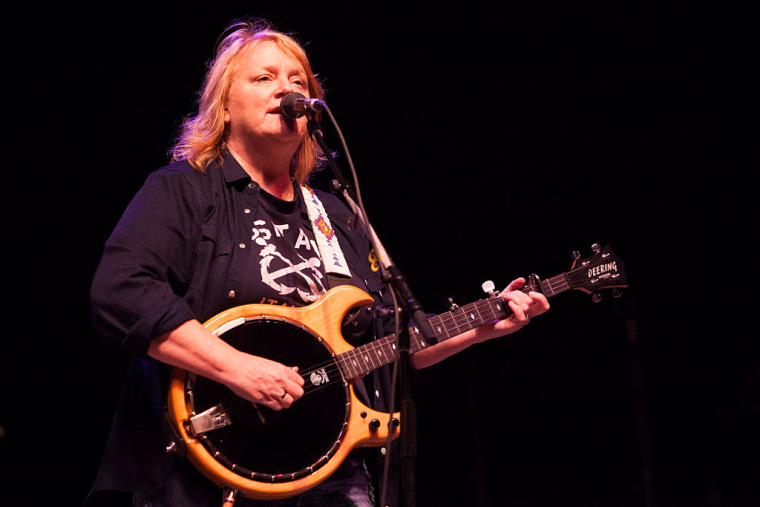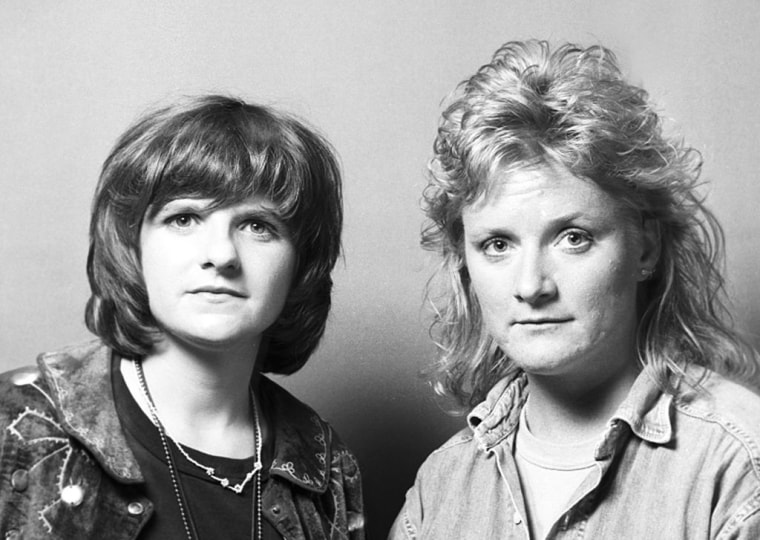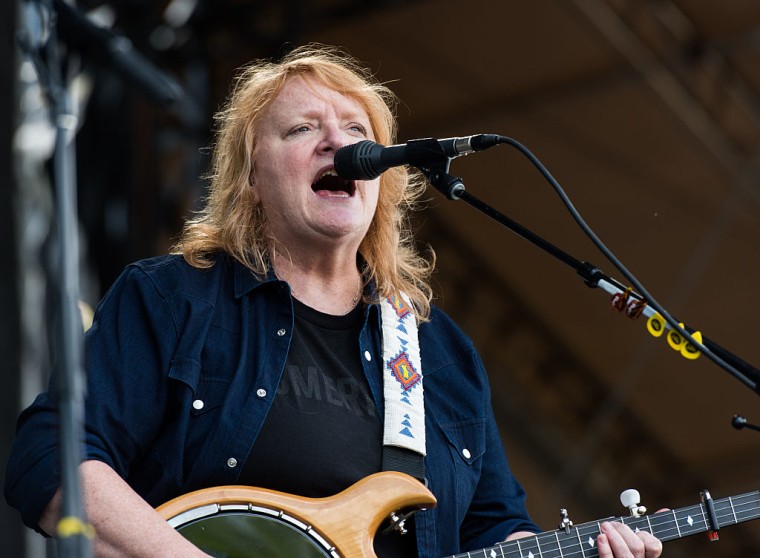Emily Saliers first met Amy Ray as sixth- and fifth-graders in Decatur, Georgia. A shared love of music (and undeniable talent) led them to start playing together in high school. They adopted the name Indigo Girls as undergraduates at Emory University in Atlanta and began recording in 1985. Their self-titled major label debut was released in 1987, and they’ve been playing to sold-out halls and recording (16 albums in total) ever since.

They began their careers as openly queer musicians and are deservedly lesbian icons. And in addition to recording, touring, and winning Grammy Awards during the last three decades, they’ve both gotten married and had daughters. Emily opened a restaurant, while Amy released some solo records –- which was something Emily never felt called to do … until now.
Emily Saliers is currently recording what will be her first solo album of her career, in her early 50s, after three decades of being a part of one of the most successful duos in music. (Don’t panic; Indigo Girls are not splitting up.) She recently launched a PledgeMusic campaign, which has already garnered an enthusiastic response. Emily sat down with NBC OUT to discuss her new record, her social justice activism and the artists she’d love to work with someday.

NBC OUT: So, you’ve been doing this for a long time, and Indigo Girls are so successful. Why did you decide that you wanted to do a solo album now?
Emily Saliers: Well, it’s probably been percolating for a long time. Very early on, when Amy and I were making records, there wasn’t really anything musically that I wanted to explore or record beyond what she and I were doing, or beyond when I was singing or writing with other artists. But then, as time went on, I began to yearn to make a record that had a rhythmic center, that reflected my love for R&B music, beats and rap music, where I wouldn’t necessarily be playing an acoustic guitar through the whole song.
So as I started to feel a stronger pull to do that, I met Lyris Hung, a violinist who has played with Indigo Girls, and I started sending her what we called “snippets,” little 30-second song ideas, and she would send me back production ideas, and I just freaked out over everything she did.
So once I found a vehicle for the direction I wanted to go with Lyris, I got really excited about the reality of making a record. And I started to get over my fears about it. I had a lot of insecurities; I love Indigo Girls, and I love working with Amy, and we have such a solid history and track record –- and I was just like, “Oh man, what am I gonna be able to do?” And then I just got over that.
NBC OUT: Tell me about the new record; any themes you notice keep popping up as you write?
ES: There’s a lot on there about what’s happening in the world. It got to the point last week where Lyris was like, “I think you might want to write a happy rock song or something?” [laughs] There’s one song that’s about Vietnam; It’s basically me asking, “How do you help to desecrate a country and then soon after that you’re having diplomatic relations with them and selling them arms?” How does that work? It doesn’t make sense to me, but it’s the way of kingdoms and governments and wars. So that’s pretty heavy, but it’s me asking, “Hey, Vietnam, can we be friends?” It’s almost like a child asking a question about this very complicated thing. I wrote another song about our manifest destiny, our history as it relates to guns, and then a couple songs that are more classic Emily songs about relationships and love lost. It’s a combination of world events, social justice events and interpersonal stories.
NBC OUT: What’s the most personal song you’ve written for the new record so far, and what’s it about?
ES: I think in terms of a song that covers a large subject matter, it’s “Hello Vietnam.” It’s very personal. I remember watching news clips from the late '60s on television, it must have been Walter Cronkite, but I remember being very affected by what I was seeing. And then Hollywood gave us its own interpretation through movies like "The Deer Hunter," and then I visited Vietnam as an adult, several years ago, and so on. So in terms of how it relates to my own path as it relates to one of the songs, “Hello Vietnam” is quite personal.
And then I just wrote a song that I haven’t even titled yet; Lyris and I just call it “The Sad One.” It’s just indicative of this perpetual ache in my heart that I have when I think about the gravity of the moon, and how it draws us through missed chances in life, and things like that. But honestly, I feel very close to all the songs. There’s one called “Spider” that Lyris wrote the music for, and it’s completely unlike anything I’ve ever done. I’ve really enjoyed stepping outside of my comfort zone, and working on a song like that.

NBC OUT: On the flip side, what’s the most political song on the record so far? Is that “Hello Vietnam” as well, or does another one spring to mind?
ES: It’s either “Hello Vietnam” or there’s another song called “OK Corral.” That’s the one that talks about our long history with guns.
NBC OUT: You’re almost as famous for being an activist as you are for being a musician; obviously there’s a lot of overlap there –- and queer activism is a big part of that. Post-marriage equality, what do you think the LGBTQ community needs to do next?
ES: We need to stand with the trans members of our community. There’s still so much hatred, prejudice, misunderstanding and really ignorance as it regards our trans family members. So that’s huge.
The queer teenage suicide rate is also disproportionately higher than the general population, so I think that outreach to queer youth, especially homeless youth, is extremely important.
So those are the first two things that strike me. Because something like the bathroom law in North Carolina is so indicative of the deep-seated prejudice against queer people.
NBC OUT: All of us? Or are they just picking on the ones that are most vulnerable now?
ES: I think it’s all of us. I think they are picking on the ones that are the most vulnerable, but I think it’s all of us. I really do think that anyone who would pass a law like that is a complete homophobe, a complete queerphobe. I believe that, because part of that bill was also not allowing jurisdictions to pass their own laws to protect the rights of LGBTQ people.
They’re just picking on people’s fears, like “Oh, you’re just going to have somebody in the bathroom who’s going to take advantage of your child.” It’s just the most diabolical, twisted way to legislate something. It’s sickening, really.
NBC OUT: And it seems like we’re having this conversation among so many communities: the rise of Black Lives Matter, the rates of violence against women, the rise of Donald Trump and the normalization of hatred. What is happening to us? Do you think we’re sliding backwards, or does it just feel that way?
ES: I think fear is meeting action -- in a way that’s more acute than we’ve seen in this country in a long time. But the complex thing about it is that the media portrays things in a way that’s just not accurate and stirs things up. So you have these real issues, like Black Lives Matter, which is a critically important movement that needs all of us as allies to its cause. And you have the media not really representing the complexity of what it means to be a black person in America today. So then you get this reaction from folks that “All Lives Matter,” and this doesn’t have anything to do with that. This has to do with what is happening to blacks in America, right now.
But for me, it’s very encouraging that all of these issues are coming to light. And the proof in the pudding is going to be what actually gets changed, who gets elected to office, what kind of legislation gets enacted, what kind of training we see for the police force so they’re not just trigger-happy, generally speaking.
So I feel encouraged, but I also feel discouraged by the media, and the knee-jerk reactions from people on social media, which just convolutes the issues, which are very clear. People of privilege, people with power are afraid that something is going to be taken away from them, or that someone who is different from them is going to cause them harm. The roots of the fear are very simple. Since time immemorial, this is what human beings have been afraid of.
NBC OUT: What’s going on in the world of music in 2016. Is this still an exciting time to make music, do you think?
ES: I think it’s so exciting! I finally gave in and started streaming music. At first I was like, “Nooo, I’m an artist! I’m not going to do that!” One day, though, the people who count the beans will figure out how to monetize it. But for me, as a fan, I’m able to discover all these bands and artists that I never would have before. I mean, for a while, the curated playlists had all this pop that didn’t really draw me in, but then there was Bon Iver and a new song by Beck and some very interesting tracks. As a listener and as a fan, I was super excited. And because you have access to everything now, it’s a very exciting time.
NBC OUT: Any artist right now, if I could make them show up tomorrow at your studio and make music with you, who would it be? Who’s the dream collaborator?
ES: Mary J. Blige. And Stevie Wonder.
Mary J. because … she just affects me. There’s something about her. Whatever she’s connected to, at her core, that comes out when she sings. It just rocks me. I bought a ticket, and flew to Memphis to see her perform, and just cried through the whole show. So I think she’s a bad-ass.
And then Stevie Wonder, just because he’s a genius. I have all of his records, and I used to sit in my room and listen to "Songs in the Key of Life" and "Inner Visions" over and over again. Not only did he speak to social issues, but his genius musicality, the chord shifts, his melodies, the way he sang, his voice. Just to get in the studio with a genius like that would be incredible.
NBC OUT: Well, maybe one of them will read this and give you a call. Let’s hope.
ES: [laughs] And if Yelawolf wants to come by and rap on it, that’d be okay too.
Emily Saliers’ as-yet-untitled debut album will be released in early 2017.
